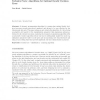Free Online Productivity Tools
i2Speak
i2Symbol
i2OCR
iTex2Img
iWeb2Print
iWeb2Shot
i2Type
iPdf2Split
iPdf2Merge
i2Bopomofo
i2Arabic
i2Style
i2Image
i2PDF
iLatex2Rtf
Sci2ools
129
click to vote
ML
2010
ACM
2010
ACM
Algorithms for optimal dyadic decision trees
Abstract A dynamic programming algorithm for constructing optimal dyadic decision trees was recently introduced, analyzed, and shown to be very effective for low dimensional data sets. This paper enhances and extends this algorithm by: introducing an adaptive grid search for the regularization parameter that guarantees optimal solutions for all relevant trees sizes, replacing the dynamic programming algorithm with a memoized recursive algorithm whose run time is substantially smaller for most regularization parameter values on the grid, and incorporating new data structures and data pre-processing steps that provide significant run time enhancement in practice. Keywords Decision tree · Classification · Learning algorithm
Related Content
| Added | 29 Jan 2011 |
| Updated | 29 Jan 2011 |
| Type | Journal |
| Year | 2010 |
| Where | ML |
| Authors | Don R. Hush, Reid B. Porter |
Comments (0)

